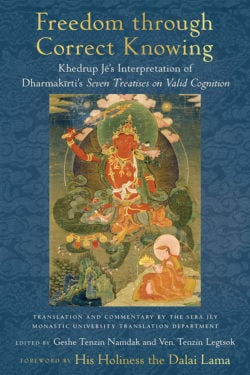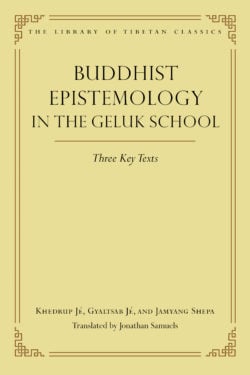Khedrup Jé

Khedrup Gelek Pelzang, better known as Khedrup Je, was one of the main disciples of Lama Tsongkhapa (1357-1419), founder of the Gelug tradition of Tibetan Buddhism. Before becoming Tsongkhapa’s foremost disciple, Khedrup Je had been a learned Sakyapa scholar. He is considered to be a reincarnation of Manjushri, the Buddha of Wisdom. He wrote an important text on Kalachakra initiation which is still used by Tenzin Gyatso, the 14th Dalai Lama, as the basis of his public initiations into the Kalachakra. Altogether, there are nine volumes of his collected works, containing fifty-eight treatises.
Books, Courses & Podcasts
Freedom through Correct Knowing
Discover a clear and accessible translation with commentary on key parts of Khedrup Jé’s Clearing Mental Darkness.
Composed at the request of His Holiness the Dalai Lama, and with a foreword by His Holiness, this translation with commentary on key parts of Khedrup Jé’s Clearing Mental Darkness: An Ornament of Dharmakirti’s “Seven Treatises on Valid Cognition” is intended for all levels of understanding. You’ll learn how a mind realizes its object, which types of consciousness realize their objects, and when a consciousness is considered to be valid in the sense of realizing its object. Having explained valid cognizers, or direct perceivers, which are essential to understanding the four noble truths, Khedrup Jé goes on to brilliantly elucidate this essential teaching of the Buddha and offers a lucid presentation of how to progress on the spiritual paths of liberation and enlightenment, including how to generate yogic perception directly realizing selflessness. With this, one develops an unmistaken realization of the fundamental reality of selflessness of persons and phenomena, which eliminates ignorance, the root cause of all mental afflictions and samsaric suffering.
Buddhist Epistemology in the Geluk School
Faced with Buddhism’s radical interdependence, one might ask, “If everything is relative, how can I be certain of anything?” Here, the descendents of Tsongkhapa plumb the nature of knowing and the tools of reasoning to come up with an answer.
This volume includes translations of three separate Tibetan works by iconic figures in the Geluk school of Buddhism. The first work, Banisher of Ignorance, is by Khedrup Gelek Palsang (1385–1438), and the second, On Preclusion and Relationship, is by Gyaltsab Darma Rinchen (1364–1432). The authors—popularly known as Khedrup Jé and Gyaltsab Jé—were the foremost disciples of the Geluk-school founder, Tsongkhapa Losang Drakpa (1357–1419). The third text, Mighty Pramāṇa Sun, is a commentary on Candrakīrti’s Clear Words (Prasannapadā) by the First Jamyang Shepa (1648–1721).
These works concern themselves primarily with the Buddhist theory of knowledge—the means by which we are able to know things and how we can be certain of that knowledge. Encapsulating this theory is the notion of pramāṇa, a concept derived from India, the Buddhist understanding of which was shaped most significantly by the masters Dignāga (fifth to sixth century) and Dharmakīrti (seventh century). Based on their explanation, pramāṇa is often translated as “valid cognition,” a literal reference to the kind of cognition that they proposed could be relied upon to supply indisputable knowledge. In recognition of the crucial role that reasoning is held to play in gaining certain knowledge, the Buddhist Pramāṇa tradition is described as a logico-epistemological system.
The works in this volume demonstrate how important scholastic rigor has been to Tibetan religion. They illustrate how those who follow the tradition have viewed the systematic approach as necessary not only for textual analysis—for those seeking to unravel the complexities of the Indian Buddhist scriptures and treatises—but also for practitioners aiming to progress along the spiritual path and achieve the higher Buddhist goals.
Learn more about the Library of Tibetan Classics
Learn about becoming a benefactor of the Library of Tibetan Classics


